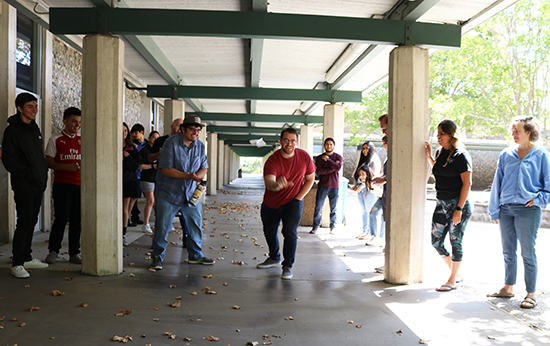STEM Calculus Academy students learn and earn in special two-week session
by Jan Janes on Aug 19, 2019For two weeks in early August, 20 students gathered at the STEM Center on Gavilan College’s Gilroy campus, meeting people across all disciplines. They identified and streamlined their own transfer requirements to four-year colleges and discovered pathways to paid summer internships. Plus...math, math and more math.
“In this program students learn teamwork,” said Diana Gonzalez, STEM counselor. “They also face confusion. They experiment with trying stuff out, practice trial and error.”
Midway through the program, small groups of students received one straw, four index cards, scissors and tape. The challenge: With no instructions, build something that will fly. At the end of an hour, the outside hallway filled with test flights, and the winning team earned academic swag, along with flight distance swagger.

Ramiro Arizpe and Alawna Thompson tried out various physical configurations.
Test flights ensued amid great anticipation.
Students shared their experiences with the program.
Ramiro Arizpe, Math major
I came to the academy looking for support, better understanding, more knowledge of how to format my studies. I wanted to learn about other opportunities out there in the math world. This experiment was a place to learn how to interact with people and work as a team. It was good practice communicating with others to develop new ideas and build something. Math is interesting and experiential skill learning. Teams experiment with engineering and physics and biology. STEM is the field to get into, you’re always learning something new.
Angela Henry, Biology major
I needed more information so I can transfer after this semester. I learned about scholarship opportunities, how to connect with study partners, and how to arrange working in labs. I was previously a liberal arts major, took one biology class and was hooked. This program is more inclusive of women, it’s so empowering to see women in science. Marla Dresch is an amazing leader, and I want to be one of them. STEM is not as hard and intensive as I thought it would be, and team support makes it easier and more enjoyable. You don’t have to be a genius to be in STEM. Bring your own creativity, motivation and drive.
James Nunes, Civil Engineering major
The stipend was a big draw: $500 for the first week and $500 if you pass the intensive math the following week. But, wow, I’m learning so much. I’m getting way much more than just the stipend. Before I just knew people in classes. Now I know students in CSIS and bio and other majors. I know the ed plan to pursue in order to transfer to SJSU, what they offer in community and support. This week I got to work with other likeminded people using creativity, motivation and drive to accomplish something. STEM has so many different majors. Scientists predict, experiment, make observations. And they are not known for giving up.
Elliott Picone, CSIS major
I took this class to see what was required, learn more about the STEM community. This summer academy helped because I didn’t know how to attend UC. The first week we heard from all these colleges and universities. Now I know my goals better, what to do to get in, because there’s so much competition. Speakers shared information about internships and ways to make yourself stand out. Without the academy, I would be going into the transfer process blind. The STEM program offers a support system to get pushed by peers to do better. We feed off one another’s energy.
The winning team checks out the swag bag. (Front table, l-r: Angela Henry,
James Nunes and Elliott Picone.)
Week one was taught by Diana Gonzalez, STEM counselor. Students learned about STEM careers, internship opportunities and transfer programs from working professionals, professors from area colleges and students. Week two was taught by Marla Dresch, math instructor and STEM III activity director. Students reviewed fundamentals of algebra and trigonometry necessary for success in calculus.
Students submitted online applications to attend the program. They received a $500 stipend for completing the first week and an additional $500 stipend for completing the second week and passing the math exam.
For more information about STEM programs and activities, contact Diana Gonzalez or Marla Dresch or call (408) 846-4915. See the experiment the students were attempting here.